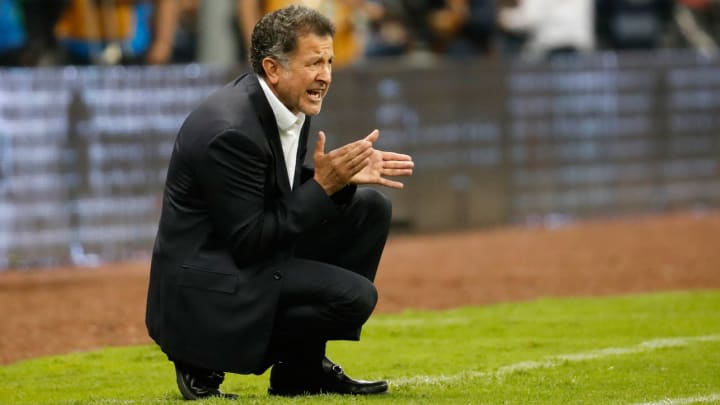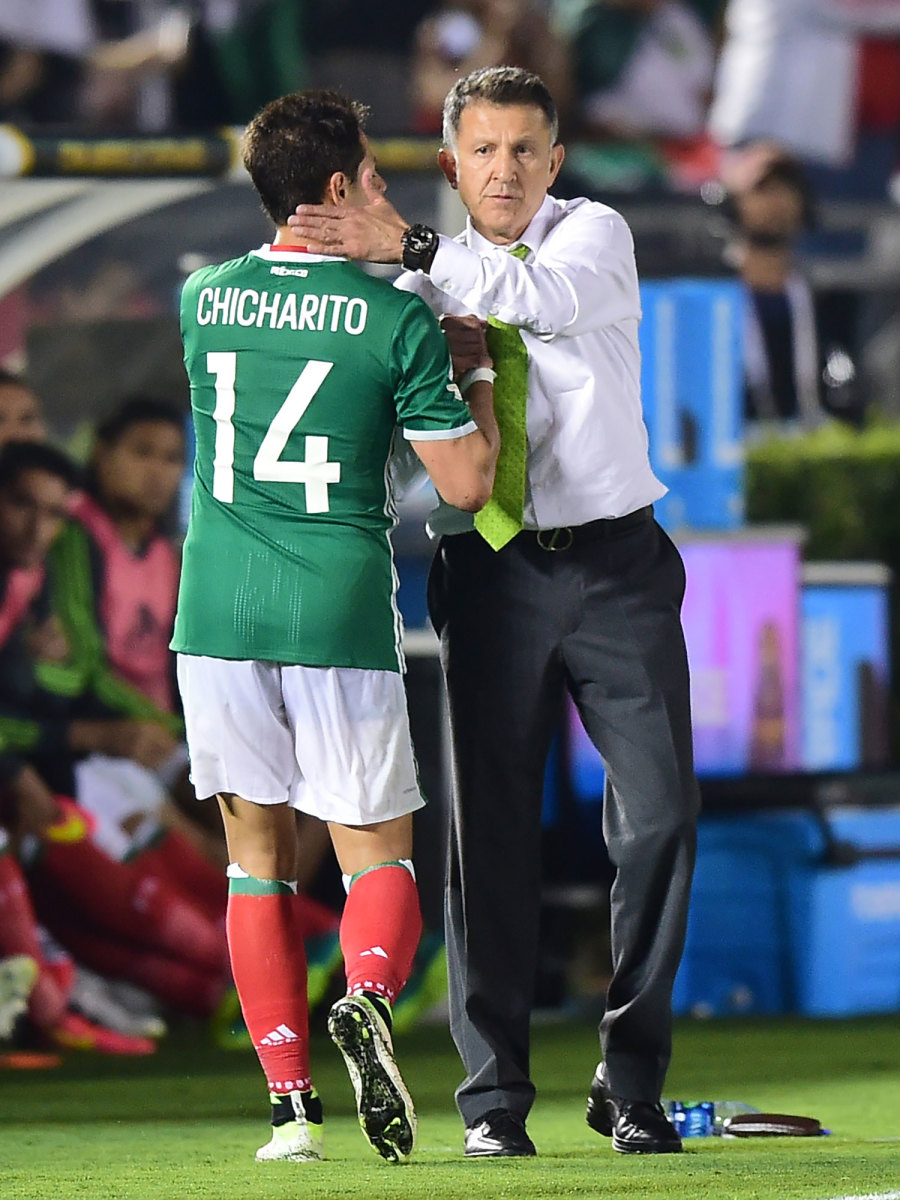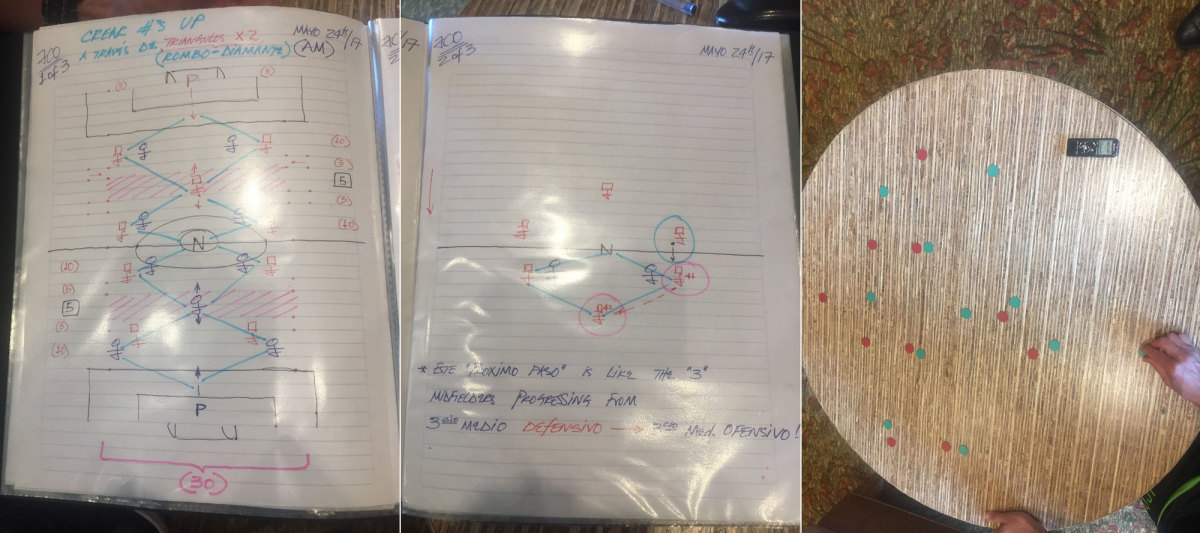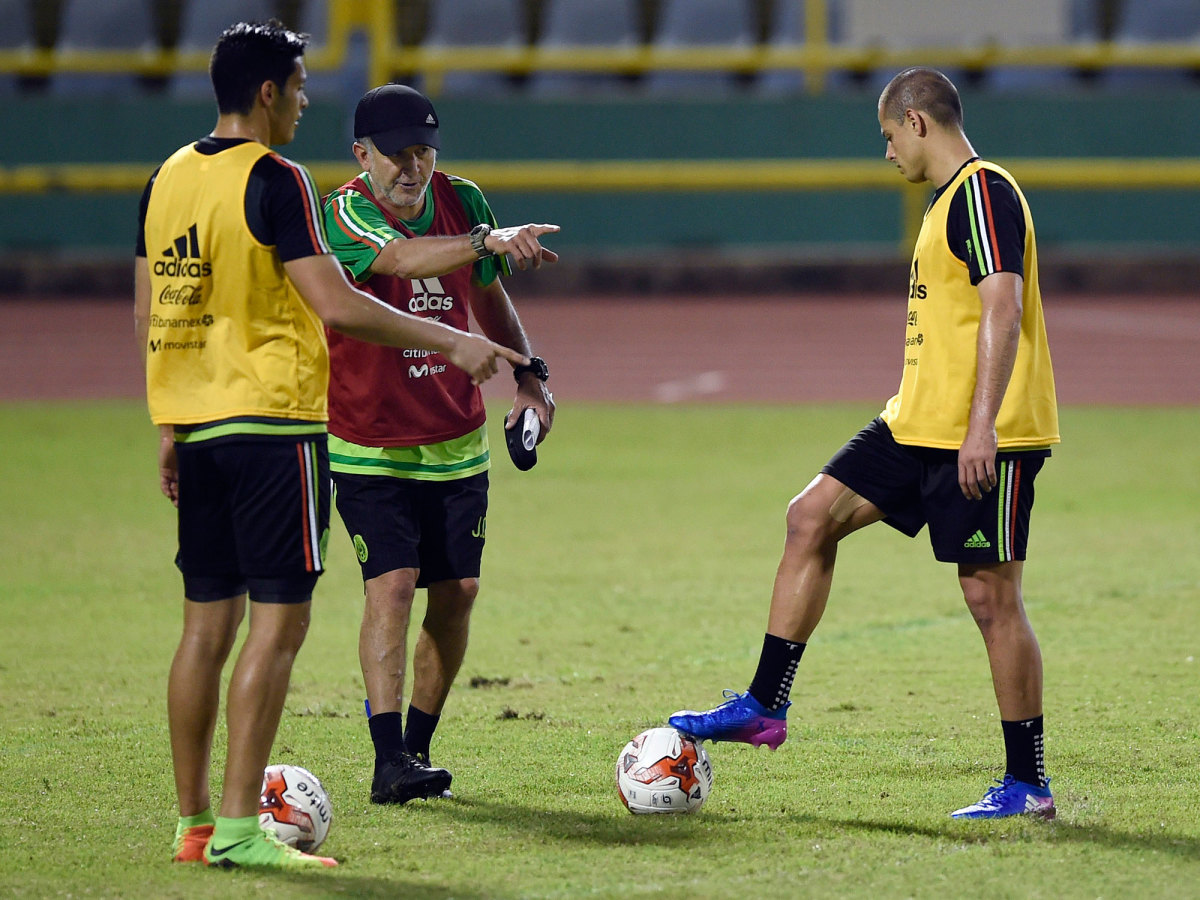Osorio's culture-changing methodology, approach win over Chicharito, Mexico

DENVER — Javier "Chicharito" Hernández, the biggest star in the Mexican soccer firmament, leans forward and makes himself explicitly clear.
Chicharito wants you to hear this. He wants Juan Carlos Osorio, the Mexican national team coach who’s sitting right next to him, to hear this. He wants Mexico’s passionate and ever-demanding fans to hear this. And he most definitely wants Mexico’s media, which has often been critical of Osorio’s player rotation policy, to hear this.
The message from Chicharito: Lay off Osorio. This man from Colombia is doing something special, something that can take Mexico to soccer heights it has never reached before. This man from Colombia has the Mexican players competing as a team, trusting each other and their coach, even if he changes the starting lineup with regularity. This man from Colombia has connected with his players, not just in the granular details of soccer—and Osorio is certainly a tactical wonk—but in the deepest of emotional ways, too.
“I feel empathy with him because he has been very criticized and very judged by a lot of people, without even having the chance to prove himself,” Hernández says in English, looking over at Osorio. “What he’s doing [with Mexico] is more than football, and that’s the most important thing. That’s what the top clubs and national teams have. And that’s why they are world champions. If we want to get there, to dream about that and go in that path, we need to do that as well.”
Watch: Mexico coasts by Honduras, extends lead atop CONCACAF Hex
Chicharito tells a story. When he first met Osorio, after a Champions League game two seasons ago, Osorio asked his star about what he thought made Sir Alex Ferguson, his former manager at Manchester United, such a remarkable figure. Hernández told Osorio that Ferguson had a gift. A team has more than two dozen players, but only 11 will start in a game. Seven will be on the bench, and all the other players on the roster will be left out entirely. And yet somehow, Chicharito told him, Ferguson was able to keep the majority of his players happy “instead of the opposite that sometimes happens.”
Nearly two years later, Hernández says, Osorio is doing the same thing with Mexico.
“He’s making the Mexican players understand why. The why of everything,” Chicharito says. “If I’m going to play, if he’s going to play over me, you understand why. A lot of coaches, they just say, ‘You are not going to play,’ or they tell you lies. He has the thing that a lot of these people don’t have: The listening. The difficult thing that he does is he goes and speaks with you, to hear what the player can say. So that’s something that is good.
“You can tell him sometimes, ‘Hey trainer, I’m playing like s--- because in my personal life I’m in a mess right now.’ Or you can say, ‘Hey trainer, I don’t feel like you can trust in me.’ But you can say it in a personal chat. Sometimes with a head coach, you can’t say the things you want to say because he can take it bad. He’s creating that [trust].”
When Hernández speaks, energy radiates from him, much as it does when he’s darting around the penalty box, an avatar of constant movement. Ask him a question, and he might keep talking for eight minutes straight. But there is more than quantity to what Chicharito is saying here. His candor borders on the astonishing. Osorio, sitting right next to him, is silent. Even he seems surprised by what Chicharito is revealing.
“I can speak about my teammates, because I’ve been with them almost 10 years,” Hernández says. “We’re here now playing in almost our third World Cup. But I feel something completely new. Everybody is happier. We want to train. We like to train. When he came, he put in his idea about rotation. It’s not easy. Everybody wants to play. There are some players that are almost Man of the Match, then in the next game he decides to give him a rest or play another player. It’s not easy.”
But this is part of the plan, Chicharito says. The plan that he thinks could take Mexico all the way to a World Cup title.
Inside the churning mind of Mexico's Javier ‘Chicharito’ Hernandez
“He’s making something different, not only for Juan Carlos Osorio, but he’s making it for Mexico,” Hernández says. “He believes in the potential that we’ve got. Unfortunately, in our country it’s difficult culturally for us to speak good about other people. We always have that feeling of, ‘I’m better than him. I deserve better things than him.’ That’s something about our country to change. And he’s changing it. If I’m not playing, it’s because it’s his decision. You need to respect that and say, ‘Hey, I’m going to be ready.’ He never makes you feel like you’re not playing because you don’t deserve it or you’re not good enough. So that’s something in your mind that you can manage better.”
Mexico has gone out in the round of 16 in the last six World Cups. But in Chicharito’s mind, Mexico should strive not just to compete to win World Cups, but to do so on a regular basis.
“We want to make that normal, like Germany do, like Brazil,” he says. “Even you guys in the USA, you want that. We want to keep that, and that’s what he’s creating: A good culture.”
On Sunday, Mexico will meet the U.S. in a World Cup qualifier at Estadio Azteca, the latest chapter in one of the world’s great sports rivalries. Chicharito is likely to start up top for Mexico. But when Mexico beat Honduras 3-0 in a qualifier on Thursday, Chicharito was not in the starting lineup. He didn’t even come off the bench. Mexico’s biggest star–and newly crowned all-time leading scorer–was not injured. He just didn’t play.
And he had no problem with that at all.

Juan Carlos Osorio opens an ordinary-looking binder with laminated sheets of paper inside. “This is all tactics,” he says. “Everything that I believe in the game is here.”
Inside are several things: Osorio’s favorite training session plans, meticulously drawn out in black, pink and light blue ink; his calendar, also color-coded, with plans for what he wants to do each day; and right there, in plain words, a page that lays out a philosophy.
“I admire [Marcelo] Bielsa, [Pep] Guardiola and [Sir Alex] Ferguson,” says Osorio, who has printed out Guardiola’s five principles of the game. “So Guardiola says, principle No. 1: The risk of always attacking. The open man is the key to keeping possession. You always have to find the opening. The next passing lane is the open man. The third man gives depth. So if I play to you and you back to me, the depth is given by the guy who is running forward. The intention of moving the ball is not to move the ball. It is to move the opposition. And finally: Always try to play in between the lines. So this risk of playing man to man, we’ll take that. It’s very risky, but we do it.”
Tactics are Osorio’s passion, and over two days in Denver he shows exactly how detail-oriented he is.

“I keep track of all the things that we do,” he says, and that includes laying out the cones on the practice field himself. (“Nobody does it for me.”) Osorio is obsessive. One morning, he spends nearly an hour with his staff dissecting video from a friendly against Croatia and debating whether they should have a one-man wall or no wall at all on free kicks from distance that can’t be shot on goal.
Osorio carries around a Ziploc bag full of green and red circular tabs that he pulls out regularly to lay out tactical explanations. When he doesn’t have the bag with him, he’ll use whatever is at hand. Over a 90-minute breakfast in Brasília last summer during the Olympics, Osorio deployed Splenda and sugar packets on the table to show me how he wanted his Mexico team to play.
Everything in a training session is to prepare for something that might happen in a game. At one practice in Denver, Osorio spends the majority of the time in a scrimmage having one team play with 10 players (in a 4-3-2) against 11 to prepare for the possibility of having a man sent off in a game.
USMNT spotlight falls on the program’s new generation of stars in Trinidad win
Osorio has always been fascinated by the tactical side of the sport. But he also freely admits he has changed fundamentally in the wake of last year’s 7-0 loss to Chile in the Copa América Centenario—a crushing defeat that nearly cost him his job. Just listen to how Osorio connects the tactical to the emotional here:
“We have created a structure that includes a 4-3-3 and a 3-4-3 with a diamond in the middle. We have a platform with three to five players in each position. So we are very familiar with the players, their characteristics, positions and versatility. And we have gone even to find out about their families and their family situation at the moment. So we establish a healthy relationship with our players, and we try to follow up. So when our players are doing well, they hear from us. But most importantly, when they are not doing very well, we make sure they hear from us. That we are there to help. So nowadays we have a very strong team, a very good team spirit.
“The players have come to understand that if we are going to improve, we have to improve in every way collectively. Not just on the field, but off the field. Now we really think that we are no longer a group of good players. We are a proper team now.”
That’s what Chicharito was talking about the most up above. The mental, emotional and relationship sides of this Mexican national team. Two games in 2016 have had the most transformative impact on Osorio’s Mexico team to make it the dominant force in CONCACAF today: The 7-0 loss to Chile and the 2-1 victory last November in Columbus, Ohio, against the United States.

Imanol Ibarrondo is a Basque Spaniard from Bilbao with kind eyes, a ready smile and the grey beard and casual but stylish wardrobe that might be worn by a chef with three Michelin stars. In point of fact, he is Mexico’s mental coach, or as Ibarrondo puts it on his Twitter profile at @energizol, a “specialist in the (trans)formation of leaders and teams.”
“My work is a job of accompaniment,” Ibarrondo says in Spanish. “I accompany others and help them transform themselves, to help convert them into people who deserve extraordinary results. This requires a process of change and transformation. It requires that players and teams take consciousness of what they’re doing, thinking and feeling—of their relationships and conversations. Of their connections that are important for the team.
“Osorio and Mexico, as you know, lost 7-0 against Chile. This was very hard for everyone: For the federation, for the players and also for the coach. You know in Mexico how they live soccer, the passion. At times it’s overwhelming. After such a significant defeat, lots of people asked for the dismissal of the coach. But this coach is very special. He looked for answers, for a way to learn from this defeat. He spent a week with Bielsa. And then he read my book.”
Ibarrondo played in the Spanish first division for Rayo Vallecano. In his book, La Primera Vez Que La Pegué Con La Izquierda (The First Time That I Kicked It With My Left Foot), the first story he tells is about a game in which his Rayo team lost 7-0 to Barcelona in the Camp Nou.
“When he read this,” Ibarrondo says, “he saw someone who might be able to understand and help!”
Bruce Arena 2.0: How USMNT's manager tackles social media and the digital age
Osorio invited Ibarrondo to spend a week with him and his staff in Mexico in October. They spent hours talking about leadership and connection, and then Osorio asked the Spaniard to come to Columbus, Ohio, with the team ahead of their World Cup qualifier against the U.S. in November. Columbus had taken on a mythical significance for both teams after the U.S. had beaten Mexico four straight times there by the same 2-0 scoreline.
On a famous night for Mexican soccer, El Tri ended the Columbus hex, beating the U.S. 2-1 on Rafa Márquez’s late set-piece goal. Ibarrondo takes great pains to give the credit for that victory to Osorio, for daring his team to be the attacking protagonist and developing a gameplan to leverage Mexico’s technical advantages while limiting the U.S.’s set-piece danger.
But in the days before that game, Ibarrondo helped lay the groundwork too with the Mexican players.
“I worked above all on the idea that we’re creating a new history for the Mexican national team,” he says. “We worked hard on their connections, having more conversations with each other, sharing their fears but also their desires. This creates a lot of connection, and that showed on the field. And the rest? I believe sometimes the universe works in your favor if you do things the right way.”
Through that success against the U.S., through his individual and group sessions with the Mexican players and staff, Ibarrondo earned their trust. After the U.S. game, Mexico hired him on a long-term basis through World Cup 2018.
For his part, Osorio has become fascinated by the study of the brain, including the fight-or-flight aspect.
“Basically, the one part of the brain that has not progressed in the last million years or more is the reptilian brain, the one that’s in charge of survival,” Osorio says. “It’s a primitive instinct. When you are driving at night and the lights of the car hit on the deer, it stays put. Because it’s paralyzed. It’s in shock. That’s the reptilian brain.
“And it also happens in sports. And they shut down and cannot react and look petrified. That’s what happened in [the 7-0 loss to Chile]. I am the first one to confess. I had never lost by more than three goals. I thought it would never happen. But I felt almost paralyzed. I had no Plan B. Now we do, because from that experience we have learned so much. Now we have Plan B and even Plan C. We know how to react.
“Most coaches prefer not to even bother reading about the mind, the brain and the emotions and just say, ‘Football is football, it’s just a game,’” Osorio continues. “But at the end of the day, it’s a game played by human beings full of emotions. And those emotions are [feeding] the decisions that they take in the game.”
In Christian Pulisic, we're witnessing the continued emergence of the USA's real deal
Osorio is well aware of the old stereotype of Mexican players: That they are often supremely talented and technically skilled, but they aren’t mentally strong enough when it matters the most. But he doesn’t buy it.
“Various Latin countries all say the same,” Osorio says. “The Peruvians say, ‘We have very talented players, but we drink too much.’ The Colombians: ‘We are very talented, but it is too easy here. We are always in the comfort zone.’ The Ecuadorians say the same. Even the Brazilians at a certain point. When I coached at São Paulo, they said, ‘There are great footballers here, but their mentality isn’t strong enough.’
“We came to the conclusion that it has a lot to do with culture and who can conquer us. The Mexicans are very similar to Colombians, Peruvians and Ecuadorians. It’s like we believe we have great talent but we can’t learn how to compete. And that’s the biggest mistake. With the proper competition, all humans can learn how to compete.”
That’s one reason why Osorio wants even more Mexican players to join their teammates in Europe, including Mexico-based players like Néstor Araujo, Hirving Lozano, Jürgen Damm, Orbelín Pineda and Alan Pulido.
At the highest levels, Osorio is now a firm believer that 90% of the sport is mental. Ending the Columbus curse against the U.S. last November—in the midst of political tensions just days after Donald Trump won the U.S. presidency—was a defining accomplishment in the transformation of his Mexican team.
“It had a lot to do with mentality,” Osorio says. “We approached that game with three specific things: A: There were no political issues. It was just a sporting event. This is football. 11 v 11; B: Recognize that the Americans are very athletic and very good on set pieces. Respect that; and C: We are a good team. We can compete against them. We were focused on those three things. And I think at the end we deserved the three points against a very good U.S. team.”
Mexico will go for the sweep against the U.S. on Sunday. A win would give Mexico 16 points from six games—a nine-point advantage over the U.S.—and virtually clinch a berth in World Cup 2018. But the bigger prize in Chicharito’s mind is what he experiences inside the Mexican team every day. It’s something entirely new.
You can sense the respect when Mexico’s biggest star turns to his Colombian coach and says: “The best thing in any sport or in any profession, and even in life, is when you meet people that can help you to get the best of you.”
